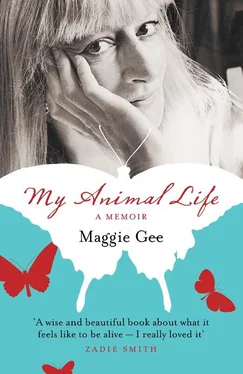Looking back, my friends have been guardian angels, though of course they were normal, human, earthbound, fallible people who saw my failings. ‘You must know there are spaces after punctuation,’ said my kind friend Tony Holden, in despair, after reading the typescript of my first novel. ‘And you can’t send envelopes like that.’ (It was on its ninth or tenth tour of service, written all over, with criss-crossing PSs.) ‘Maggie, pick up your purse and your gloves,’ sighed Barbara, watching me scatter my possessions once again, myopically carefree, all over the floor. ‘Please don’t leave the light on in the kitchen,’ begged Grania. ‘And perhaps you could be careful not to slam the door.’ ‘Your letters are over the top,’ said Beverly. ‘You don’t have to thank me so much. I don’t like it.’
One summer, Grania came down to see us, her steady step on the wooden stairs. She had been thinking about the rent. We nodded, resigned. It was very low, and yet we did not earn much money. But she said, ‘I’ve been looking at my outgoings. I thought I would put the rent down three pounds.’ Twelve pounds less per month! It was a fortune to us.
Pure chance, if there’s really any chance in life: I had found her through an advertisement in Time Out , in summer 1980. I had survived my rackety beginnings in London, working as a live-in maid in Chelsea where I was expected to dust the carpets and the lady of the house walked behind me, inspecting; the ‘free basement flat’ she supplied in return turned out to leak rain all over my books, and the woman was demented, and I was trapped, but my friends, Jim Stredder, Tony, Phil, emerged from the trees when I sent desperate postcards—‘I am enslaved to a madwoman’—and once again helped me, joined forces to get me out of there. Then I fell on the shambling, eccentric sweetness of Maria Iwtschenko’s house in Chiswick, inhabited by elderly Russians who had been expropriated in the Revolution, and one embattled but fascinating Polish countess, where I had a green bedsit with a gas-ring and a sink, and paid the rent by doing shifts as a hotel receptionist. When Maria Iwtschenko, by now in her eighties, had to sell the house, I spotted the ad that Grania had placed.
Large sunny room would suit quiet person . I turned up for the interview looking unfeasibly unquiet, in cream jacket and trousers with a shocking pink tie, pink belt, pink earrings, and bright pink socks which were the icing on the cake, a very pink, very creamy cake. I was shy, in fact, but I hid it well.
Grania looked at me, and seemed to quite like me. She asked me if I was ‘very sociable’, a question perhaps aimed at all that pinkness (I was blind, I think, to the effect of my clothes, which were curiously at odds with my real habits, which were, indeed, mostly scholarly and quiet. I didn’t see people for days on end; I read voraciously; I wrote.) I was finishing a PhD, I told her. She already had one, on nineteenth-century literature. She overlooked the pink. She let me in.
On our improvised wedding day, which nobody knew about but Grania (that is, except for Barbara, our bridesmaid, and John Waite, the best man), she left two presents in the kitchen: a large white hat — it was blazing August — and a beautiful unorthodox wedding cake, a sponge cake covered with strawberries and peaches. When we returned from Cambridge we were the house’s young marrieds, an exception to the other female poets and students. I am sure we were sometimes noisy and annoying, because two people together laugh and chatter a lot, and there are lovers’ quarrels, which is worse, and two typewriters rattled on different floors, but she knew that we loved her, and the tall blue house, and the garden she had garlanded with old-fashioned roses, pale pink, cream, white, Gertrude Jekyll style, among tall blue delphiniums and fragile harebells, and in the morning, she would stand there among them, watching things emerge, weeding, thinking, with her large blue thoughtful eyes and thick hair. ‘Every time you make love, it is a sacrament,’ she said.
She had nothing in common with a landlady.)
But now it was 1986, I was pregnant, and a baby wouldn’t suit the tiny shared shower room in the basement, and its crying certainly wouldn’t be quiet. Now once again they emerged from the wings, my cast of friends, and helped us to move. I had become very worried about our books. I was far too unwieldy to pack or unpack them. The new flat, now stripped of both damp and asbestos, was in many ways delightful, but had no bookshelves. Nick seemed very busy doing who knows what. I was busy growing, slow and sleepy. For the first time in my life, I was probably restful. I swam in hormones. I let things be.
On the evening of the move, he took me over to the flat. I was eight months pregnant and expected to find chaos. Instead, I found the front room completely shelved up, with the books all installed in alphabetical order, and standing in front of them, the friends who had helped with electric drills, know-how, muscle. Musa, Campbell, Barbara. I cheered, they cheered, we drank to each other. There is a picture of me standing, curved out like a pear, by a wall of books, crying with happiness.
But I knew that Grace , the novel I was writing, didn’t work. No one had told me, no one had read it, but I couldn’t fail to see the plot was becalmed, I fell asleep when I tried to read it; and the narrative hadn’t even managed to climb from the leisure of my notebooks into the viability of typescript; it was dull, dull, that was the truth, and the baby was coming, and I wasn’t ready, except for the physical act of birth, which I’d tried to prepare for with classes and yoga. Would there be a life beyond the birth? If so, I had no idea how to live it. I phoned Brent Childcare Services in a panic. A calm voice told me about child-minders. I only needed to know they were there. Now I could face the great adventure.
But why did I feel, even at that point, that I would cease to exist if I couldn’t go on writing? Why have I always needed to write? In a way, it has always defined my life. It made me think I could never have children; I accepted it; I had to be a writer. I wrote poetry from infants’ school onwards. It’s as if I had signed up to some cult at six. In my last long vacation from Oxford, I wrote my first novel, in a four-week monastic burst of activity, up in the attic of a chalet in Switzerland my parents had rented with my father’s brother, the very first time we hadn’t gone camping. I wrote it, really, by arithmetic. This is the meaning of ‘Ignorance is bliss.’ I thought, ‘The average novel is 100,000 words long,’ and divided that sum by the available days (25), so wrote 4,000 words a day, because that was what was needed to get it done, though it did seem to mean an awful lot of work, and left me no time to reread what I had written.
My father had given me a ‘can-do’ attitude. I’m grateful to him. For all my naivety, for all the weaknesses of what I poured out, something important had been achieved. I remember the happiness of the last day, when I had dotted the ‘i’s of the last sentence, and walked up with Aunty Hilda through the pines to the resort of Montana Vermala, where we bought exotic food to entertain the others. How game Hilda was, Dad’s younger brother’s wife, a trait which perhaps helped her live into her nineties, surviving all the brothers and all the other wives. Our one rule on that happy day was: ‘Buy food that none of us has eaten before.’ I remember only vine leaves stuffed with rice, which were unknown in Britain in 1969. I was utterly happy as we climbed down the mountain with bags full of oily, alien food. I was queen of the earth. I was a novelist, now, because I’d written a novel.
Читать дальше












